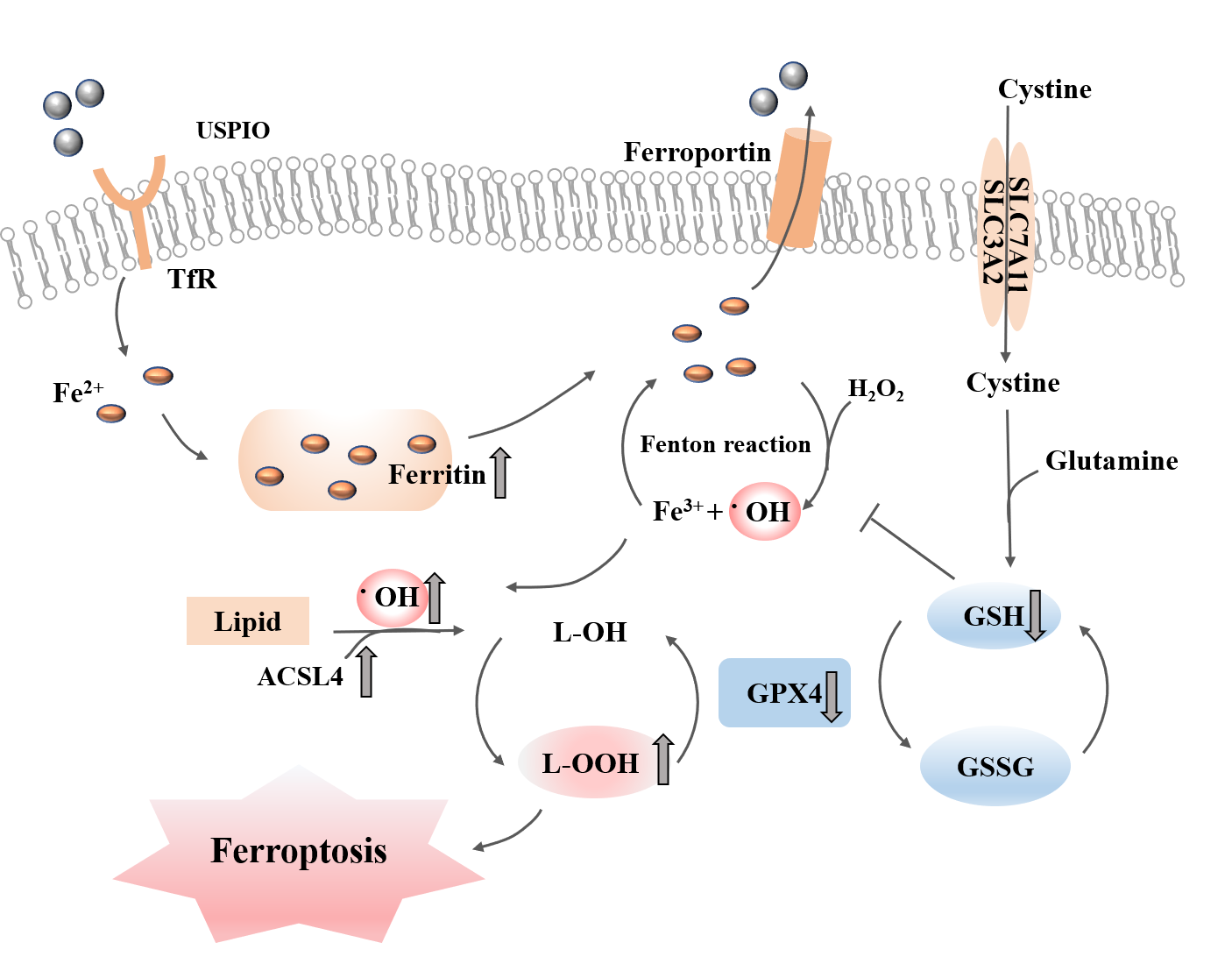近日,我院劳动卫生与环境卫生研究团队在纳米毒理学研究领域取得了重要进展。相关研究成果以“Time-course effect of ultrasmall superparamagnetic iron oxide nanoparticles on intracellular iron metabolism and ferroptosis activation”为题发表在期刊Nanotoxicology(IF=4.925,毒理学1区)(DOI 10.1080/17435390.2021.1872112)上。
铁死亡是通过铁离子紊乱引起脂质过氧化物积累的方式导致细胞氧化性死亡。有研究表明,帕金森综合征、缺血再灌注损伤、乳腺癌、胰腺癌等很多疾病都与铁死亡密切相关。本研究旨在探讨超小顺磁性氧化铁纳米颗粒(ultrasmall superparamagnetic iron oxide nanoparticles, USPIO)在胞内铁代谢的调控机制,为以铁死亡为基础的疾病治疗提供新的靶点。利用X射线吸收近边结构(X-ray absorption near edge structure, XANES)来确认USPIO在细胞铁代谢过程中,胞内铁化学形态的变化。使用qPCR和蛋白印迹等分子生物学技术探讨铁代谢相关基因表达的改变。通过高内涵的荧光成像技术定量胞内脂质过氧化和活性氧水平,最终联合转录蛋白组学和流式细胞术证实铁死亡通路的激活。
经研究发现,铁蛋白等铁代谢相关基因表达改变与作用时间存在时间依赖关系。USPIO在胞内代谢中,谷胱甘肽消耗增加,谷胱甘肽过氧化物酶4活力降低,通过荧光探针BODIPY C11 581/591证实胞内脂质过氧化物增加。本研究为USPIO毒性评价提供研究依据,也为后续铁死亡诱导剂的研发提供研究基础。青岛大学特聘教授唐敬龙与国家纳米科学中心陈春英研究员为本文共同通讯作者,硕士生高金玲和周会鸽博士为本文共同第一作者。上述研究得到了国家重点研发计划(2017YFC1600200)和国家自然科学基金(81872651、31571027)的支持。
Recently, the research team of occupational and environmental health of our school has made great progress in the field of nanotoxicology. The related research results were published in the journal Nanotoxicology (IF=4.925, toxicology 1 area) (DOI 10.1080/17435390.2021.1872112) under the title of " Time-course effect of ultrasmall superparamagnetic iron oxide nanoparticles on intracellular iron metabolism and ferroptosis activation ".
Ferroptosis is an iron-dependent cell death that caused by excessive peroxidation of polyunsaturated fatty acids. It has been implicated in a broad range of physiological and pathological processes, including degenerative diseases, acute renal failure, ischemia-reperfusion injury and tumorigenesis. This study aims to explore the intracellular regulatory mechanism of USPIO and to provide a new target for ferroptosis-based disease therapy. X-ray absorption near edge structure technique was used to characterize iron species time-course changes of USPIO. The expression of iron metabolism-related genes was investigated by qPCR and western blot. Intracellular lipid peroxidation and reactive oxygen species were quantified by high-content analysis. The ferroptosis signaling alteration was confirmed by combined transcriptome data and flow cytometry.
It was found that the expression changes of iron metabolism-related genes were time-dependent. Also, the accumulation of GSH and time-dependent downregulation of GPX4 induced ferroptosis were related to the time-course of USPIO metabolism. Lipid peroxidation fluorescence signals measured by the BODIPY C11 581/591 probe gradually increased. Together, these findings provide groundwork for utilizing USPIO either by being alone or in combinatorial as inducer of ferroptosis, and underline the importance of comprehensive assessment of their toxicity. Prof. Jinglong Tang & Chunying Chen are corresponding author of this manuscript. Ms. Jinling Gao and Dr. Huige Zhou are the co-first author. This work was financially supported by the National Science Foundation of China (81872651, 11621505) and the Ministry of Science and Technology of China (National Basic Research Program 2017YFC1600200).


